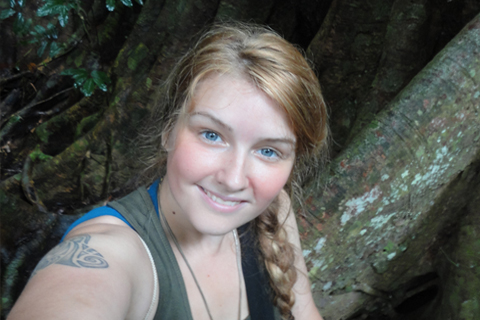I dreamed of a lush, green rainforest. The type you see in a Disney movie with an explosion of flora, orangutans climbing the heights of the jungle and a host of dangerous critters. But on the island of Borneo, where I was campaigning against deforestation, this is a fantasy.
I woke from my dream at 6 a.m. in the back of a pickup truck. Our activist group had arrived at a village in West Kalimantan. We walked a beaten path, banners and cameras in tow, to support a fight to protect the remaining local forest. The palm oil industry had been encroaching on the land of a Dayak community without consent. We thought if we could garner enough attention, we could save what was left of this 130 million-year-old rainforest. We were wrong.
Walking past the village, I looked through the haze of the dewy mist onto the land. A harsh reality sank in: The forest had already been taken. Nothing left but the stumps of fallen great giants and the buzzing of insects. In its place, crudely planted palm oil saplings in rows of a vast monoculture plantation. It was a ghost of a rainforest.
It became clear to me then that I was failing as an activist. Despite gaining media attention and banner-waving in solidarity with local activists during the autumn of 2011, it wasn’t enough. It was not just bad timing, but our inability to think outside our own activism box. This was a hard pill for me to swallow, as activism was literally my life.
I was born into the environmental movement. My father was the founding president of Greenpeace and my mother was the first woman to save a whale by using her body to block a harpoonist at sea. In the 1970s, my parents, along with a small group of Greenpeace co-founders, had won many battles – such as ending Russian and Australian whaling and the Canadian seal hunt (for a time).
But my parents also failed on occasion and had to reinvent themselves time and again. In fact, it was through failure that Greenpeace began – after the U.S. detonated a nuclear bomb on a vulnerable Alaskan island during underground testing. A small group of activists known as the Don’t Make a Wave Committee travelled by ship to put their bodies in harm’s way yet could not stop the blast. But with the attention their campaign stirred, they rebranded themselves as Greenpeace – now an international organization.
Perhaps now the entire environmental movement needs to be reinvented. Often we rely on the tried-and-true strategies of our parents (myself included), expecting similar victories. But in the face of climate change, we are at an impasse. Raising awareness isn’t enough. Today, it will take a new kind of activism appropriate for this generation if we are to effect significant change yet again. Call it Activism 2.0.
For me, Borneo proved this. Like my parents, I failed and had to reinvent myself. I decided to become a storyteller, focusing on a new narrative – how my own generation is redefining what environmental activism means. I wrote a book entitled The Next Eco-Warriors, and am now adapting it into the documentary Activist 2.0.
I’ve met women and men from around the world who aren’t your typical activists. More tech-savvy than their parents, they’re using online tools to mobilize on scales never seen before. For example, 350.org is a youth-led group that organized the Global Day of Action on climate change and used social media to spark 7,000 events held in 188 countries. And this past summer, a group called The Black Fish used drones armed with cameras, not guns, to track illegal drift-netting operations off the Mediterranean coast.
For me, what I have learned across two generations is that environmentalism needs to evolve, much like species. But will activism evolve in time to effect significant change yet again? I can only hope.
One thing is certain: failure creates a great opportunity for transformation.
Emily Hunter’s (BA 2011 UTSC) film is scheduled for release in 2015. Visit www.Activist2.com
Emily Hunter, who presented at TEDxUTSC in February 2013, talks about youth activism:
Recent Posts
People Worry That AI Will Replace Workers. But It Could Make Some More Productive
These scholars say artificial intelligence could help reduce income inequality
A Sentinel for Global Health
AI is promising a better – and faster – way to monitor the world for emerging medical threats
The Age of Deception
AI is generating a disinformation arms race. The window to stop it may be closing




